15 Mar2016
By Kristin McCabe
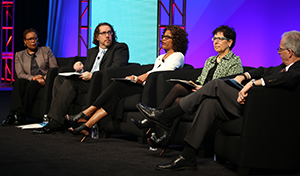 Members of the AACTE Executive Committee held a Town Hall Meeting February 24 at the AACTE 68th Annual Meeting in Las Vegas, providing updates to the membership on key work of the Association and answering questions submitted by the audience on various programmatic and professional issues.
Members of the AACTE Executive Committee held a Town Hall Meeting February 24 at the AACTE 68th Annual Meeting in Las Vegas, providing updates to the membership on key work of the Association and answering questions submitted by the audience on various programmatic and professional issues.
AACTE President/CEO Sharon P. Robinson opened the session with her annual “state of the Association” report. She announced that membership numbers are up to 823 institutional and 32 affiliate members and that several exciting new initiatives are under way—replacing or updating others to be more responsive to member needs. The long-operating Professional Education Data System (PEDS), for example, is now suspended in favor of a new data initiative that will aggregate and report on existing data sets, create benchmarking potential for programs, and more.
15 Mar2016
By Michelle Kotek
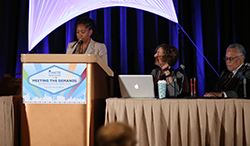 AACTE’s 2016 Annual Meeting in Las Vegas, Nevada, addressed the demands of professional practice and the tough questions that face educators on a variety of fronts. On February 24, the editors of the Journal of Teacher Education (JTE)chose to focus their major forum on “Equity, Access, and the Digital Divide: Challenges for Teacher Education,” bringing together panelists from around the country who are working to close opportunity gaps for young people relative to—and through—the use of technology.
AACTE’s 2016 Annual Meeting in Las Vegas, Nevada, addressed the demands of professional practice and the tough questions that face educators on a variety of fronts. On February 24, the editors of the Journal of Teacher Education (JTE)chose to focus their major forum on “Equity, Access, and the Digital Divide: Challenges for Teacher Education,” bringing together panelists from around the country who are working to close opportunity gaps for young people relative to—and through—the use of technology.
After JTE Coeditor Gail Richmond of Michigan State University introduced the panelists, the discussion started with Hardin Coleman, dean and professor in the School of Education at Boston University (MA). He spoke about shared characteristics of gap-closing schools, accreditation standards, and the steps he sees as necessary to close the technological gap. Coleman suggested focusing on the role of educators in the gap-closing process, deep engagement with educational partners, and supporting the systems of data that will inform progress. He championed efforts to create education systems that will provide a high-quality learning experience for all children.
14 Mar2016
By Jerrica Thurman
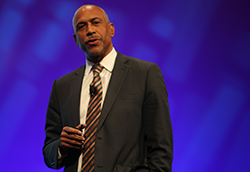 The Welcoming Session kicked off the AACTE 68th Annual Meeting with a keynote from Pedro Noguera, distinguished professor at the University of California Los Angeles and one of the nation’s most important voices on education and equity issues.
The Welcoming Session kicked off the AACTE 68th Annual Meeting with a keynote from Pedro Noguera, distinguished professor at the University of California Los Angeles and one of the nation’s most important voices on education and equity issues.
Noguera challenged the audience to take a closer look at what it means to be a highly effective teacher. As the American student population becomes increasingly diverse and opportunities remain profoundly unequal, he argued that more teachers must have the ability to teach effectively across race, class, language, and cultural differences.
“The best teachers teach the way students learn rather than expecting students to learn the way they teach,” Noguera said.
08 Mar2016
By Melvin Bogard and Amanda Lester
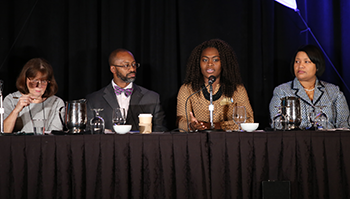
Holmes Scholar Whitney Watkins shares a student’s perspective during a major forum at the AACTE 68th Annual Meeting
Over the past few years, AACTE has been leading efforts to advance teacher diversity in the education workforce through the establishment of the AACTE Black and Hispanic/Latino Male Teachers Initiative Networked Improvement Community (NIC) and the expansion of the AACTE Holmes Program. Both initiatives are dedicated to increasing the recruitment and retention of educators from historically underrepresented groups into the education profession. The NIC’s work is identifying and testing strategies to increase the recruitment and retention of Black, Hispanic, and Latino males in the teaching workforce, and the Holmes Program supports aspiring educators at various points in their education careers to enter teaching, administration, policy, and the professoriate.
08 Mar2016
By Amanda Zullo
As a practicing high school classroom teacher, I have made it a point to be aware of educational happenings. When the Common Core standards were introduced I learned what they were and whom they affected and thought about the impacts on how I would teach the upcoming students. As edTPA and other higher education reforms began to occur I registered to score edTPA to learn about what it was. I continued to monitor the higher education landscape from a distance. I remained in close contact with three institutions of higher education where conversations would dabble in shifts but never seemed to be too urgent.
Looking from the outside in, it is easy to deduce why you think certain things are occurring. Prior to attending the AACTE Annual Meeting, I had some experience working in teacher preparation during the summer and by hosting preservice teachers. I updated my knowledge of changes in law during my fall focus groups, researched factors impacting teacher preparation that connected findings from our Hope Street Group Teacher Preparation Report, and even spoke with individuals who worked within teacher prep at various universities within New York State. I perceived myself as well informed with (as always) some room for growth.
08 Mar2016
By Melvin Bogard
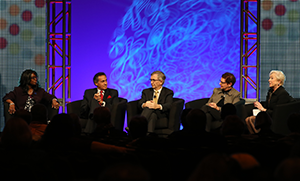 The AACTE Speaker Spotlight Session ended the 68th Annual Meeting February 25 by focusing on the tough questions facing educator preparation across the nation. Panelists urged the audience to tackle complex issues by addressing them as a community, going beyond a one-dimensional viewpoint. They expressed what they saw as the greatest challenges facing the field, ways to enhance the educator pipeline, and models that will foster growth within the education workforce.
The AACTE Speaker Spotlight Session ended the 68th Annual Meeting February 25 by focusing on the tough questions facing educator preparation across the nation. Panelists urged the audience to tackle complex issues by addressing them as a community, going beyond a one-dimensional viewpoint. They expressed what they saw as the greatest challenges facing the field, ways to enhance the educator pipeline, and models that will foster growth within the education workforce.
The panel was moderated by Nancy Zimpher, chancellor of the State University of New York. Panelists included National Board Certified Teacher Cheryl Redfield from Highland Junior High (AZ); Daniel A. Domenech, executive director of AASA: The School Superintendents Association; Anthony S. Bryk, president of the Carnegie Foundation for the Advancement of Teaching, and Carol Basile, dean and professor in the College of Education at the University of Missouri Saint Louis.
01 Mar2016
By Kristin McCabe
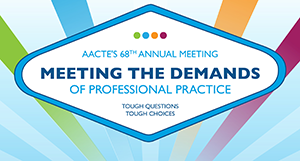 AACTE welcomed more than 2,050 participants to Las Vegas last week for its 68th Annual Meeting, focused on the theme “Meeting the Demands of Professional Practice: Tough Questions, Tough Choices.” Ed Prep Matters will feature coverage of various sessions in the coming days, but other content is available right now—so why wait?
AACTE welcomed more than 2,050 participants to Las Vegas last week for its 68th Annual Meeting, focused on the theme “Meeting the Demands of Professional Practice: Tough Questions, Tough Choices.” Ed Prep Matters will feature coverage of various sessions in the coming days, but other content is available right now—so why wait?
29 Feb2016
By Matthew Wales
Now through May 31, AACTE is accepting session proposals for the 69th Annual Meeting, to be held in Tampa, Florida, March 2-4, 2017. We also invite applications by May 17 for AACTE member faculty to review proposals.
The conference theme is “Acting as One: The Power of the Professional Community,” conceptualized as follows in the call for proposals:
18 Feb2016
By Kristin McCabe
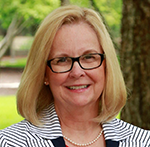 AACTE has selected Ena Goodrich Shelley, professor and dean of the College of Education at Butler University (IN), to receive the 2016 AACTE Edward C. Pomeroy Award for Outstanding Contributions to Teacher Education. The award will be presented at the 68th AACTE Annual Meeting Welcoming Session, Tuesday, February 23, at The Mirage Hotel in Las Vegas.
AACTE has selected Ena Goodrich Shelley, professor and dean of the College of Education at Butler University (IN), to receive the 2016 AACTE Edward C. Pomeroy Award for Outstanding Contributions to Teacher Education. The award will be presented at the 68th AACTE Annual Meeting Welcoming Session, Tuesday, February 23, at The Mirage Hotel in Las Vegas.
The Pomeroy Award, named for longtime AACTE Executive Director Edward C. Pomeroy, recognizes distinguished service either to the educator preparation community or to the development and promotion of outstanding practices in educator preparation at the collegiate, state, or national level.
Dean Shelley wins accolades in both of these categories, captured in an impressive nomination portfolio submitted by a passionate coalition of faculty, staff, and students at Butler and beyond.
18 Feb2016
By Kristin McCabe
 AACTE has chosen Matthew Ronfeldt of the University of Michigan School of Education to receive the 2016 AACTE Outstanding Journal of Teacher Education (JTE) Article Award for his article “Field Placement Schools and Instructional Effectiveness,” published in the September/October 2015 issue of the journal. The award will be presented at the 68th AACTE Annual Meeting Speaker Spotlight Session, Thursday, February 25, at The Mirage Hotel in Las Vegas.
AACTE has chosen Matthew Ronfeldt of the University of Michigan School of Education to receive the 2016 AACTE Outstanding Journal of Teacher Education (JTE) Article Award for his article “Field Placement Schools and Instructional Effectiveness,” published in the September/October 2015 issue of the journal. The award will be presented at the 68th AACTE Annual Meeting Speaker Spotlight Session, Thursday, February 25, at The Mirage Hotel in Las Vegas.
Ronfeldt’s study aimed to determine (a) what types of schools in an urban district are used most for preservice field placement, (b) what school characteristics make a difference in the effectiveness (gauged by value-added measures, or VAM, in reading and math) of the teachers placed there, and (c) whether teachers’ effectiveness corresponds to the degree of match between their preparation sites and the schools where they currently work.
18 Feb2016
By Kristin McCabe
 AACTE will honor Monica T. Billen, assistant professor in the Kremen School of Education at California State University, Fresno, with the 2016 AACTE Outstanding Dissertation Award for her study #Learningtoteach: Using Instagram to Elicit Pre-service Teacher Reflection. The award will be presented at the 68th AACTE Annual Meeting Speaker Spotlight Session, Thursday, February 25, at The Mirage Hotel in Las Vegas.
AACTE will honor Monica T. Billen, assistant professor in the Kremen School of Education at California State University, Fresno, with the 2016 AACTE Outstanding Dissertation Award for her study #Learningtoteach: Using Instagram to Elicit Pre-service Teacher Reflection. The award will be presented at the 68th AACTE Annual Meeting Speaker Spotlight Session, Thursday, February 25, at The Mirage Hotel in Las Vegas.
Billen’s study investigated how using participant-driven images on Instagram influenced reflective expression among preservice teachers during a yearlong internship. By employing a photojournalistic approach, teacher candidates constantly noticed their surroundings and used these “noticings” as catalysts for deeper, more critical reflections. Participants touted this method as much more connected to real life, collaborative, and interesting than traditional reflection methods. Amassing more than 1,800 photos over a year’s time, preservice teachers built a unique visual data set using familiar technology combined with written and oral reflections.
18 Feb2016
By Kristin McCabe
 AACTE will honor Anthony S. Bryk, president of the Carnegie Foundation for the Advancement of Teaching, with the 2016 AACTE Lifetime Achievement Award. The award will be presented at the 68th AACTE Annual Meeting Speaker Spotlight Session, Thursday, February 25, at The Mirage Hotel in Las Vegas.
AACTE will honor Anthony S. Bryk, president of the Carnegie Foundation for the Advancement of Teaching, with the 2016 AACTE Lifetime Achievement Award. The award will be presented at the 68th AACTE Annual Meeting Speaker Spotlight Session, Thursday, February 25, at The Mirage Hotel in Las Vegas.
Bryk will be honored especially for his transformative work at the Carnegie Foundation developing the field of improvement science in education—lessons of which he will then be sharing as a panelist at the Speaker Spotlight Session.
18 Feb2016
By Kristin McCabe
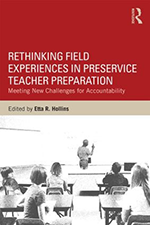 AACTE has chosen Rethinking Field Experiences in Preservice Teacher Preparation: Meeting New Challenges for Accountability, edited by Etta Hollins of the University of Missouri-Kansas City, to receive the 2016 AACTE Outstanding Book Award. The award will be presented at the 68th AACTE Annual Meeting Welcoming Session, Tuesday, February 23, at The Mirage Hotel in Las Vegas.
AACTE has chosen Rethinking Field Experiences in Preservice Teacher Preparation: Meeting New Challenges for Accountability, edited by Etta Hollins of the University of Missouri-Kansas City, to receive the 2016 AACTE Outstanding Book Award. The award will be presented at the 68th AACTE Annual Meeting Welcoming Session, Tuesday, February 23, at The Mirage Hotel in Las Vegas.
Published by Routledge in 2015, this edited volume offers a robust set of perspectives on critical and challenging elements of teacher preparation—how field experiences are designed to support preservice teachers while they are learning to teach. Chapters are organized into three sections focusing on “approximation and representation of practice,” “learning teaching situated in context,” and performance assessment and program improvement. The book provides a collection of models of field experiences across a variety of teacher preparation contexts and deeply examines how the experiences are theorized, designed, and implemented for preservice teacher learning.
18 Feb2016
By Kristin McCabe
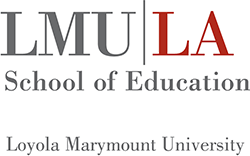 AACTE has selected the Loyola Marymount University School of Education (CA) to receive the 2016 AACTE Best Practice Award in Support of Multicultural Education and Diversity. The award will be presented at the 68th AACTE Annual Meeting Welcoming Session, Tuesday, February 23, at The Mirage Hotel in Las Vegas.
AACTE has selected the Loyola Marymount University School of Education (CA) to receive the 2016 AACTE Best Practice Award in Support of Multicultural Education and Diversity. The award will be presented at the 68th AACTE Annual Meeting Welcoming Session, Tuesday, February 23, at The Mirage Hotel in Las Vegas.
All of the education programs at Loyola Marymount University (LMU) are grounded in principles such as the promotion of social justice, cultural responsiveness, inclusion, value and respect for all individuals, and leadership that is moral, intellectual, responsible, and caring. Their effectiveness is evident in the conceptual framework, curriculum, commitment of faculty and staff, and the culturally and linguistically diverse teacher candidates and students throughout the programs.
18 Feb2016
By Elizabeth Finsness
 AACTE’s Committee on Innovation and Technology has selected the University of Nebraska–Lincoln (UNL) to receive the 2016 AACTE Best Practice Award for the Innovative Use of Technology for Tech EDGE, a collaborative partnership between UNL and eight PK-12 partner school districts. The award will be presented during the Speaker Spotlight Session on Thursday, February 25, at the AACTE Annual Meeting in Las Vegas.
AACTE’s Committee on Innovation and Technology has selected the University of Nebraska–Lincoln (UNL) to receive the 2016 AACTE Best Practice Award for the Innovative Use of Technology for Tech EDGE, a collaborative partnership between UNL and eight PK-12 partner school districts. The award will be presented during the Speaker Spotlight Session on Thursday, February 25, at the AACTE Annual Meeting in Las Vegas.
Tech EDGE infuses best practices in technology integration centering on the ideas of technological pedagogical content knowledge (TPACK). The partnership is dedicated to preparing preservice teachers with research and theory in university courses and practical applications in schools. As 21st-century skills are adopted locally and across the nation, it is critical that teacher preparation programs and schools work together to determine how to best teach the skills that are necessary in a diverse, global, and digital world.
 Members of the AACTE Executive Committee held a Town Hall Meeting February 24 at the AACTE 68th Annual Meeting in Las Vegas, providing updates to the membership on key work of the Association and answering questions submitted by the audience on various programmatic and professional issues.
Members of the AACTE Executive Committee held a Town Hall Meeting February 24 at the AACTE 68th Annual Meeting in Las Vegas, providing updates to the membership on key work of the Association and answering questions submitted by the audience on various programmatic and professional issues. 









 The
The  AACTE welcomed more than 2,050 participants to Las Vegas last week for its 68th Annual Meeting, focused on the theme “Meeting the Demands of Professional Practice: Tough Questions, Tough Choices.” Ed Prep Matters will feature coverage of various sessions in the coming days, but other content is available right now—so why wait?
AACTE welcomed more than 2,050 participants to Las Vegas last week for its 68th Annual Meeting, focused on the theme “Meeting the Demands of Professional Practice: Tough Questions, Tough Choices.” Ed Prep Matters will feature coverage of various sessions in the coming days, but other content is available right now—so why wait? AACTE has selected Ena Goodrich Shelley, professor and dean of the
AACTE has selected Ena Goodrich Shelley, professor and dean of the  AACTE has chosen Matthew Ronfeldt of the
AACTE has chosen Matthew Ronfeldt of the  AACTE will honor Monica T. Billen, assistant professor in the
AACTE will honor Monica T. Billen, assistant professor in the  AACTE will honor Anthony S. Bryk, president of the
AACTE will honor Anthony S. Bryk, president of the  AACTE has chosen
AACTE has chosen  AACTE has selected the
AACTE has selected the  AACTE’s Committee on Innovation and Technology has selected the University of Nebraska–Lincoln (UNL) to receive the 2016 AACTE Best Practice Award for the Innovative Use of Technology for
AACTE’s Committee on Innovation and Technology has selected the University of Nebraska–Lincoln (UNL) to receive the 2016 AACTE Best Practice Award for the Innovative Use of Technology for